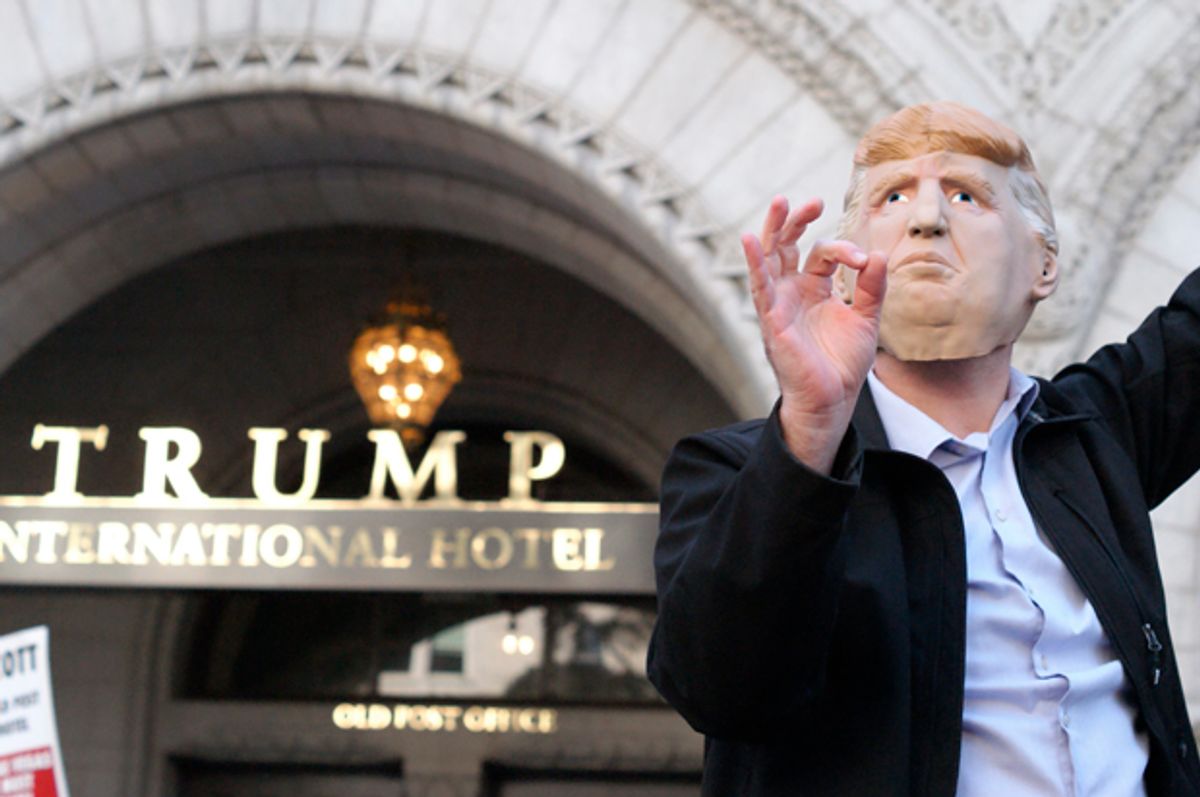This article originally appeared on AlterNet.
Donald Trump's secret weapons are a paper shredder and a delete button. The white nationalist rhetoric and "lock her up" chants might have been getting all the attention, and Trump himself lost his mind with glee over FBI Director James Comey's announcement of potential new Hillary Clinton emails, but the candidate and his companies have been conveniently destorying thousands of emails and paper documents as requested by prosecutors going back decades, a new investigation from Newsweek's Kurt Eichenwald reveals.
The pattern of behavior predates email even—since at least 1973, when both Donald Trump, his father Fred Trump, and their companies were sued by the federal government over charges that they systematically refused to rent apartments to black tenants. Trump began by stalling and missing deadlines to turn over important and likely incriminating, documents for months. As Eichenwald points out, this was particularly egregious because:
When litigation is filed or even contemplated, scrupulous lawyers and corporations immediately impose document-retention programs or require that any shredding or disposing of records be halted. Courts have handed down severe sanctions or even criminal charges of obstruction of justice against executives and companies that destroyed records because they knew they were going to be sued.
Trump used the extra time to tell the press that "that the feds had no evidence he and his father discriminated against minorities, but instead were attempting to force them to lease to welfare recipients who couldn’t pay their rent." He also filed a $100 million countersuit for libel, which only dragged the case further. Even when the government lawyers had warrants to search Trump's offices, he would act as if they showed up unannouced, refusing to give over the materials that even judges demanded, and taking every opportunity he could to tell reporters that "stormtroopers" had invaded his offices, and the prosecutor had unlawfully badgered his employees by asking them to turn over documents that were explictly, and more importantly, legally demanded by a judge. After over six months of delays, Trump himself finally admitted in a deposition that, as Eichenwald notes:
The Trumps had been destroying their corporate records for the previous six months and had no document-retention program. They had conducted no inspections to determine which files might have been sought in the discovery requests or might otherwise be related to the case. Instead, in order to “save space,” Trump testified, officials with his company had been tossing documents into the shredder and garbage.
That case ended in a civil settlement, but despite an agreement to implement policies that would force Trump's company to comply with federal housing regulations, the blatant discimination continued. In fact, Trump's strategy, which Eichenwald describes as "deny, impede and delay, while destroying documents the court had ordered them to hand over," has been effective ever since, and even more so when the plantiffs are private citizens.
Eichenwald cites two egregious cases in particular, both in Florida. In Fort Lauderdale, a group of tenants claimed they were scammed by Trump into buying apartments, because they were led to believe that Trump owned the development. But he had merely licenced his name to the developers, which means when the project became problematic financially, he simply walked away, and claimed to have no insurance to cover his liabilities nor pay the tenants the money they lost for apartments they would never live in. It turned out of course, that the company had a policy, but they simply hid that fact. The case, one of a number of similar suits Trump faced during this period, settled out of court.
Eichenwald also points out that even when Trump is the one suing, destroying and hiding documents is a regular practice for him. In 2005, Trump sued Cordish Cos., whose affiliate, Power Plant Entertainment LLC, built two American Indian casinos in Florida in 2000. He claimed the companies had colluded with a former associate to cheat him out of the project, and therefore both casinos should be turned over to him entirely. Not even partial profits, but absolutely everything. One might think such a claim wouldn't be made without a mountain of documentation for evidence, but that isn't Trump's style. A year into the case, there was only a box of documents, nearly all of them irrelevant.
Later, Trump's team said the required evidence hadn't been produced because the company didn't have it. Somehow, a multi-million dollar company did not have an email server in 2001 (a year after the supposed wrongdoing in the development deal had occurred), nor a document retention program until 2003. High school students had better data backup that he did. It took almost another year to refute this claim, and it turned out an IBM server had of course been installed in 1999. But it didn't matter. Everything was gone.
Despite claiming that a document retention program had been started in 2003,
"the company wiped clear the data from everyone’s computers every year. Lawyers for Trump Hotels had never sent out the usual communication issued during litigation instructing employees to stop destroying records that might be related to this case. The deletions continued, and backup tapes were reused—thus erasing the data they held."
Trump has made a mockery of our justice system. The textbook definition of projection, he demands that his opponent be put in jail for much more minor versions of the same crimes he's used to defraud innocent Americans, not to mention the government, for decades. As Eichenwald puts it, "He has solemnly told the country to trust him while refusing to produce any records to prove whether he speaks the truth or has utter contempt for it."





Shares